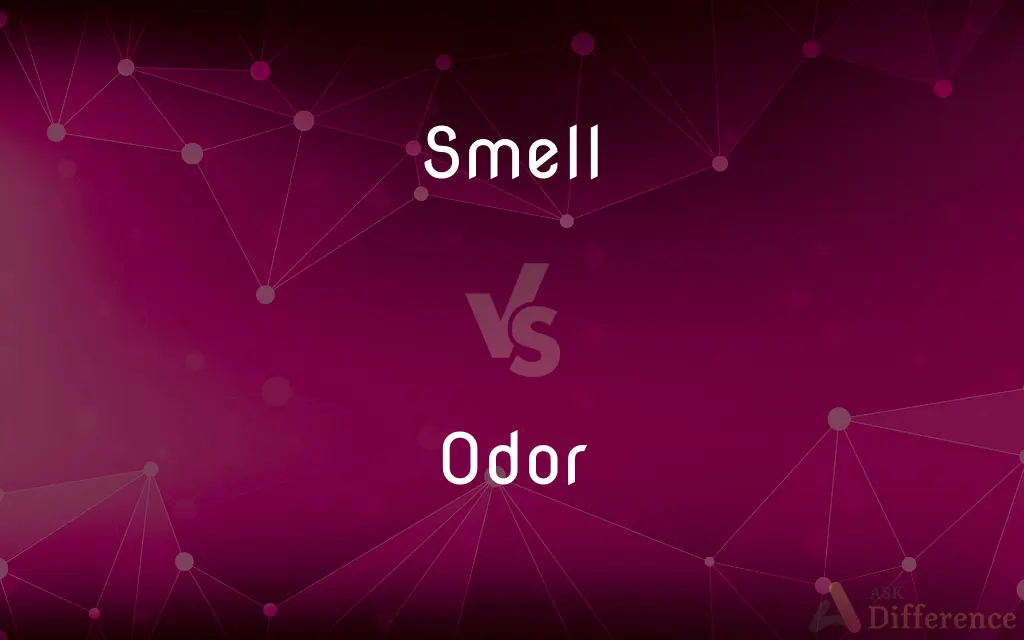Smell vs. Odor — What's the Difference?
Edited by Tayyaba Rehman — By Maham Liaqat — Updated on March 15, 2024
Smell is a more general term for the sensation perceived by the olfactory system, whereas odor often implies a specific, sometimes unpleasant scent.

Difference Between Smell and Odor
Table of Contents
ADVERTISEMENT
Key Differences
Smell encompasses the broad range of scents perceived by the nose, from the delightful aroma of fresh flowers to the pungent scent of spoiled food. It is a neutral term that can describe any type of scent, whether pleasant or unpleasant. On the other hand, odor often carries a connotation of an unpleasant or offensive scent, though it technically can refer to any smell. The term "odor" is frequently used in scientific, environmental, and health contexts to describe a particular smell that has specific characteristics or implications.
The perception of a smell is a subjective experience, influenced by individual preferences, memories, and cultural associations. For instance, the smell of a certain perfume may be delightful to one person while overwhelming to another. In contrast, an odor, particularly when described as such, usually suggests a consensus on its unpleasant nature, such as the odor of decaying organic matter, which is universally recognized as offensive.
Smells play a significant role in daily life, influencing mood, behavior, and even social interactions. They can evoke memories, affect taste perception, and serve as warnings for potential dangers, like the smell of smoke signaling a fire. Odors, especially when persistent or particularly strong, can impact quality of life and health, leading to situations where odor control measures are necessary, such as in waste management or industrial settings.
In language and communication, the choice between "smell" and "odor" can convey subtle differences in meaning or attitude. Describing something as having a "fresh smell" suggests a positive sensory experience, while referring to an "unpleasant odor" implies a desire to avoid or remove the source of the smell.
Despite their nuanced differences, "smell" and "odor" are often used interchangeably in everyday language. The context in which they are used can greatly affect the perceived meaning, with "odor" tending to be reserved for situations where the smell is notably undesirable or requires attention due to its intensity or source.
ADVERTISEMENT
Comparison Chart
Connotation
Neutral, can be pleasant or unpleasant
Often implies an unpleasant or offensive scent
Usage
General term for any scent perceived by the olfactory system
More specific, often used in scientific, environmental, and health contexts
Subjectivity
Highly subjective, influenced by personal preference and experiences
Usually suggests a consensus on its unpleasant nature
Impact
Can evoke memories, affect mood and taste, serve as warnings
Can affect quality of life and health, especially if strong or persistent
Communication
Choice of term can convey different attitudes or impressions
Often used to emphasize the need for action or concern due to unpleasantness
Compare with Definitions
Smell
The property of a substance that is perceived by the olfactory system.
The smell of freshly baked bread filled the kitchen.
Odor
A scent, often unpleasant or offensive.
The odor of rotten eggs indicated a gas leak.
Smell
Integral to memory and emotion.
The smell of rain on dry earth always brought back memories of his childhood.
Odor
Implies a need for action or resolution.
They installed an air purifier to eliminate the persistent odor in the basement.
Smell
Can be associated with both positive and negative experiences.
The smell of chlorine reminds me of summer swimming lessons.
Odor
Used in contexts requiring scientific, environmental, or health considerations.
The study focused on the odor emissions from the factory.
Smell
Influences taste and other sensory perceptions.
The cold diminished her sense of smell, making food taste bland.
Odor
Can signify a specific characteristic or source.
The chemical has a distinctive sulfuric odor.
Smell
A neutral term for any type of scent.
Lavender has a calming smell that many people enjoy.
Odor
Affects well-being and comfort levels.
The foul odor in the room made it difficult to concentrate.
Smell
The sense, located in the nasal cavities of mammals and relying on the olfactory nerves, by which molecules borne in a fluid such as air can be perceived; the olfactory sense.
Odor
An odor (American English) or odour (British English; see spelling differences) is caused by one or more volatilized chemical compounds that are generally found in low concentrations that humans and animals can perceive by their sense of smell. An odor is also called a "smell" or a "scent", which can refer to either a pleasant or an unpleasant odor.
Smell
A similar sense in other animals, as insects' ability to perceive air-borne molecules with their antennae.
Odor
A quality of something that is perceived by the sense of smell
Kitchen odors.
Smell
The act or an instance of smelling
Got a smell of the pie.
Odor
A strong, pervasive quality
An odor of sadness permeated the gathering.
Smell
A quality of something that is perceived by the sense of smell; an odor
The smell of a barn.
Odor
Esteem; repute
A doctrine that is not currently in good odor.
Smell
A distinctive enveloping or characterizing quality; an aura or trace
The smell of success.
Odor
Any smell, whether fragrant or offensive.
Smell
To perceive (an odor) by the sense of smell.
Odor
(figuratively) A strong, pervasive quality.
Smell
To perceive or detect (something) by a chemosensory organ, such as an antenna.
Odor
Esteem.
Smell
To inhale the air near (something); sniff
Smiled as she smelled the rose.
Odor
Something which produces a scent; incense, a perfume.
Smell
To detect or discover, as by intuition or inference
We smelled trouble ahead. The committee tried to smell out corruption in law enforcement.
Odor
Any smell, whether fragrant or offensive; scent; perfume.
Meseemed I smelt a garden of sweet flowers,That dainty odors from them threw around.
Smell
To use the sense of smell.
Odor
Any property detected by the olfactory system
Smell
To sniff
The dog was smelling around the bed.
Odor
The sensation that results when olfactory receptors in the nose are stimulated by particular chemicals in gaseous form;
She loved the smell of roses
Smell
To have or emit an odor
"The breeze smelled exactly like Vouvray—flowery, with a hint of mothballs underneath" (Anne Tyler).
Smell
To have or emit an unpleasant odor; stink
This closet smells.
Smell
To be suggestive; have a touch of something
A remark that smells of sanctimony.
Smell
To appear to be dishonest or corrupt
The political situation is starting to smell.
Smell
A sensation, pleasant or unpleasant, detected by inhaling air (or, the case of water-breathing animals, water) carrying airborne molecules of a substance.
I love the smell of fresh bread.
Smell
(physiology) The sense that detects odours.
Smell
(transitive) To sense a smell or smells.
I can smell fresh bread.
Smell the milk and tell me whether it's gone off.
Smell
Followed by like or of if descriptive: to have a particular smell, whether good or bad.
The roses smell lovely.
Her feet smell of cheese.
The drunkard smelt like a brewery.
Smell
To smell bad; to stink.
Ew, this stuff smells.
Smell
To have a particular tincture or smack of any quality; to savour.
A report smells of calumny.
Smell
To detect or perceive; often with out.
Smell
(obsolete) To give heed to.
Smell
(transitive) To smell of; to have a smell of
Smell
To perceive by the olfactory nerves, or organs of smell; to have a sensation of, excited through the nasal organs when affected by the appropriate materials or qualities; to obtain the scent of; as, to smell a rose; to smell perfumes.
Smell
To detect or perceive, as if by the sense of smell; to scent out; - often with out.
Can you smell him out by that?
Smell
To give heed to.
From that time forward I began to smellthe Word of God, and forsook the school doctors.
Smell
To affect the olfactory nerves; to have an odor or scent; - often followed by of; as, to smell of smoke, or of musk.
Smell
To have a particular tincture or smack of any quality; to savor; as, a report smells of calumny.
Praises in an enemy are superfluous, or smell of craft.
Smell
To exercise the sense of smell.
Smell
To exercise sagacity.
Smell
The sense or faculty by which certain qualities of bodies are perceived through the instrumentally of the olfactory nerves. See Sense.
Smell
The quality of any thing or substance, or emanation therefrom, which affects the olfactory organs; odor; scent; fragrance; perfume; as, the smell of mint.
Breathing the smell of field and grove.
That which, above all others, yields the sweetest smell in the air, is the violent.
Smell
The sensation that results when olfactory receptors in the nose are stimulated by particular chemicals in gaseous form;
She loved the smell of roses
Smell
Any property detected by the olfactory system
Smell
The general atmosphere of a place or situation and the effect that it has on people;
The feel of the city excited him
A clergyman improved the tone of the meeting
It had the smell of treason
Smell
The faculty of smell
Smell
The act of perceiving the odor of something
Smell
Inhale the odor of; perceive by the olfactory sense
Smell
Emit an odor;
The soup smells good
Smell
Smell bad;
He rarely washes, and he smells
Common Curiosities
What measures can be taken to control odors?
Odor control measures might include ventilation, air purification, use of odor-neutralizing agents, and addressing the source of the odor, such as waste management practices.
What determines how a smell is perceived?
Individual preferences, memories, and cultural associations heavily influence how a smell is perceived, making it a highly subjective experience.
How are smells and tastes related?
The sense of smell is closely linked to taste; many flavors are actually perceived through the olfactory system. A diminished sense of smell can lead to a reduced ability to taste foods.
Is the sense of smell the same for everyone?
While the basic mechanism of smelling is similar, the perception of smells varies widely among individuals due to differences in olfactory receptors, experiences, and personal associations.
Why are smells important?
Smells are crucial for various reasons, including evoking memories, influencing taste and mood, and serving as indicators of environmental conditions or potential dangers.
Can an odor be pleasant?
Technically, "odor" can refer to any smell, but it often implies an unpleasant one. However, in scientific contexts, it might simply denote a specific scent without connoting unpleasantness.
How can odors impact health?
Persistent or particularly strong odors, especially from harmful substances, can affect health by causing headaches, nausea, or even more serious conditions depending on the odor's nature and intensity.
Can certain smells trigger allergies?
Yes, certain smells, especially those associated with chemicals or pollutants, can trigger allergic reactions or sensitivities in some individuals, leading to symptoms like sneezing, congestion, or headaches.
Why do some odors linger longer than others?
The persistence of an odor can depend on the substance's volatility, the environment's ventilation, and the odor's source. Some molecules are more prone to linger in the air or adhere to surfaces, prolonging the odor.
What role do smells play in nature?
In nature, smells play a critical role in communication among species, navigation, and signaling danger, such as the scent of smoke indicating fire.
Share Your Discovery

Previous Comparison
Flame vs. Frame
Next Comparison
Yacht vs. CruiseAuthor Spotlight
Written by
Maham LiaqatEdited by
Tayyaba RehmanTayyaba Rehman is a distinguished writer, currently serving as a primary contributor to askdifference.com. As a researcher in semantics and etymology, Tayyaba's passion for the complexity of languages and their distinctions has found a perfect home on the platform. Tayyaba delves into the intricacies of language, distinguishing between commonly confused words and phrases, thereby providing clarity for readers worldwide.
















































